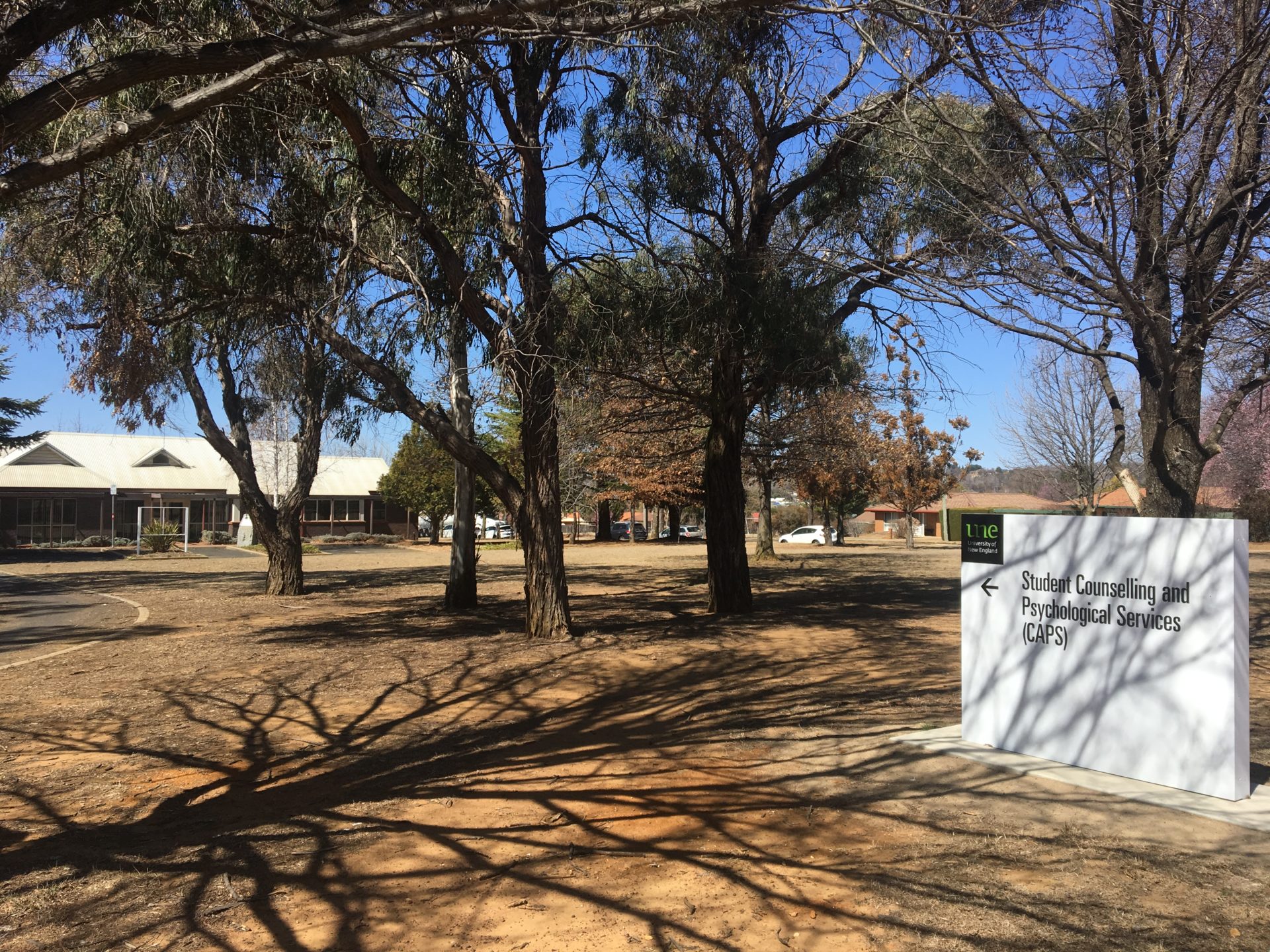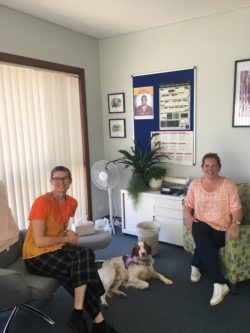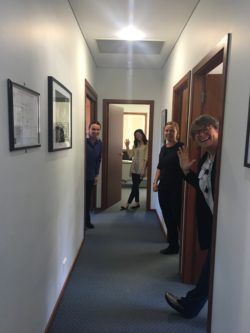
Counselling FAQs with CAPS Manager, Annette Stevenson
Are you about to see a psychologist for the first time?
Regardless of your reason for seeking psychological support, it can put your mind at ease to know what to expect.
We know it can be nerve-wracking to make the step to book an appointment, let alone attend the appointment and open up to a complete stranger. It’s common to wonder if your problems are ‘bad’ enough to warrant seeing a psychologist. But you’ll never know the benefits you could gain without giving it a go.
Maybe you’ve been to a psychologist before, but you’re wondering about how UNE Counselling and Psychological Services (CAPS) operates.
Annette Stevenson, UNE CAPS Manager, has the answers to all your burning questions about counselling, psychologists and CAPS.
What does CAPS offer?
Well, we know that study doesn’t occur in a vacuum; that “@#$%” happens and it can mean studies and personal wellbeing are negatively impacted. For this reason we provide a free, safe and confidential way for currently enrolled students to discuss their personal, academic or other concerns. UNE students are located anywhere in Australia, or the world for that matter, therefore, we offer individual counselling by phone, Zoom (online), or in person – allowing for time zone differences of course! We also support couples (where both are students), as well as student groups.
We also run seminars and webinars for students on topics such as assertiveness, stress management, exam prep
aration, etc. We would love to hear what sorts of workshops students would like to see us offer, so please send ideas to studentcounselling@une.edu.au.
Who are the staff and what are their qualifications?

The staff currently comprise myself, Belinda, Deb, Lucy, Kylie, as well as Gwen who is on maternity leave in 2020. We are all registered psychologists but sometimes have other discipline-trained staff, such as social workers and counsellors, within the team. There would be no less than 50 years of experience across our team and probably as many years of combined undergrad and postgrad study. We never stop learning, not just from our clients, but we also engage in continuous professional development. This is to ensure we provide best-practice to students.
How can I book an appointment?
The best way to make an appointment is to ring our reception on 02 6773 2897. If we try to organise appointments via email or AskUNE, it can mean emails back and forth. By ringing, Penny and Sally on reception can check all free times while a student is on the phone. Also, we plan to have an online booking system for some of our appointments, so watch out for news about this in the near future!
How long is an appointment?
Appointments can be up to 50 minutes long, and we allow up to 90 minutes for couples. Sometimes we might have short “check-in” appointments, so no one is compelled to sit through a whole session if it isn’t needed. We also want to make sure students can fit appointments around their class time-table.
What types of questions will I be asked?
Our first question is usually something like “what made you decide to make this appointment?” or “how can I help?” There is no right or wrong way for students to answer those questions. Many students are not sure where to start. We are patient and will ask questions to help us understand what a student may need. We might ask about family, friends, study, finances, diet, sleep, exercise, relationships, etc.
The kinds of questions students ask us can be anything from “how do I get over this homesickness?” to “how can I sleep?” to “I have a thesis to write and can’t get motivated. Can you help?”.
Am I able to seek a mental health diagnosis at CAPS?
We welcome seeing the “worried well”. These are students who are generally coping but may need to problem solve or talk certain things out in order to stay well.
We also see students who have previously received a mental health diagnosis and are linking in with CAPS for support while studying. We also see students who have good self-awareness and do seek to understand if they have a mental health condition. If we determine that a student may meet a mental health diagnosis (such as depression, or anxiety) we will discuss this with them, will look at strategies to manage their health, and this might include options such as a referral to a GP or elsewhere as needed.
How can a psychologist help me if I do not have a mental illness?
Our role is to help students irrespective of whether they do or don’t have a “mental illness”. We are focussed more on how to promote good “mental health” and, as mentioned above, welcome the “worried well” or students who know things are not going as they’d hope, and who want to take proactive and preventative steps to get things back on an even keel.
Students definitely do not need to be in a crisis to see us. “Interpersonal” concerns are the most common issue students talk to us about.
What is expected of me?
Some students are encouraged or “referred” to counselling by a friend, GP, academic, or family. We appreciate it is not always a student’s decision to come to counselling. We ask those students to be open to how they think counselling might help them and why they think people suggested they come along. That said, most students “self-refer”, which means it is their decision to come to counselling. What do we expect of students? That they know counselling is for them, not us; and that we are there to facilitate them working on their concerns. From a practical point of view, we expect students to turn up on time; to let us know if they can’t make an appointment; and if we are ringing them, that they are not driving and are in a quiet and private place. 
What can I expect of my psychologist?
Irrespective of whether you are seeing a psychologist, social worker or accredited counsellor within our team, you can expect the staff member to be professional, respectful, friendly, ethical, and informed about issues affecting students. All staff are expected to keep up-to-date with best practice in their field, and to also be aware of policies and procedures within the University and how they relate to student needs.
What if I don’t ‘click’ with my psychologist?
This does sometimes happen but for a whole lot of reasons. Sometimes things that are not working for a student outside of counselling then “play out” in the counselling room. We will discuss any patterns or similarities with the student. Other times we are simply not the best fit for the student and will give them the option of seeing another staff member. Sometimes the student may be seeking something that our Service can’t offer and we will refer them to a service that can. We are not offended if a student elects to see someone else but, where possible, we do encourage students to see the same person for continuity. If a student is possibly “counsellor” shopping/hopping, this is something we would be flagging within our team.
How many sessions can I get?
We are not a large team and are mindful that we are there to provide a service for on-campus and online students. For this reason, we aim to provide brief interventions that a student can balance out with their studies and other commitments.
Many students may see us only one time and are good to go. Others may need more regular appointments. The average number of sessions is 3. We will refer students to specialist services if that student is requiring intensive and regular support that is beyond what we can provide.
While we don’t have an official cap on the number of sessions someone can have, we will review how many sessions we can offer based on client need, service demand, how effective counselling is, whether we are the best service for the student, etc.
What if I booked the appointment to get supporting documentation for a special exam, special extension of time or special consideration?
Students will at times be told to see a counsellor for support documentation, but sometimes we are not the appropriate service to provide that support. For example, documentation from a GP, lawyer, employer, police, etc may be more relevant.
If a student has accessed our Service a few times, we are in a stronger position to provide support, but if we have only seen a student the once, there are times where we can only verify what a student told us but do not know how much weight a letter from our Service will carry. Other times we know that a student has tried to get on with their studies and perhaps left accessing support too late, and we will do our best in our documentation to help the student explain their circumstances to relevant staff.
Will I be expected to go back?
If the counsellor has suggested a follow-up appointment, then yes. If no follow-up appointment was advised, this might be because a situation is already resolved, is not ongoing, the timing isn’t right, etc. But if an appointment has been agreed to, then a student ideally should come back. It is frustrating to allocate time for follow-up and then not have a student attend. That missed appointment is one we could be offering to someone else. If someone doesn’t come back, it also leaves us wondering if the student may find themselves in a similar situation in the future.
Big thanks to Annette for answering these FAQ’s!
CAPS is just one section in a range of support services available to UNE students. For the A-Z of UNE support services, check out our blog here.
If difficult circumstances are affecting your study, you can contact us for assistance at advocacy@une.edu.au or on (02) 6773 3116. If you’re on campus, feel free to visit our office in the Arcade, to the north of Café Life. Whether it’s a quick chat, a referral to another part of UNE, or assistance drafting applications to UNE, we are here to help.
You’re never alone at UNE.


